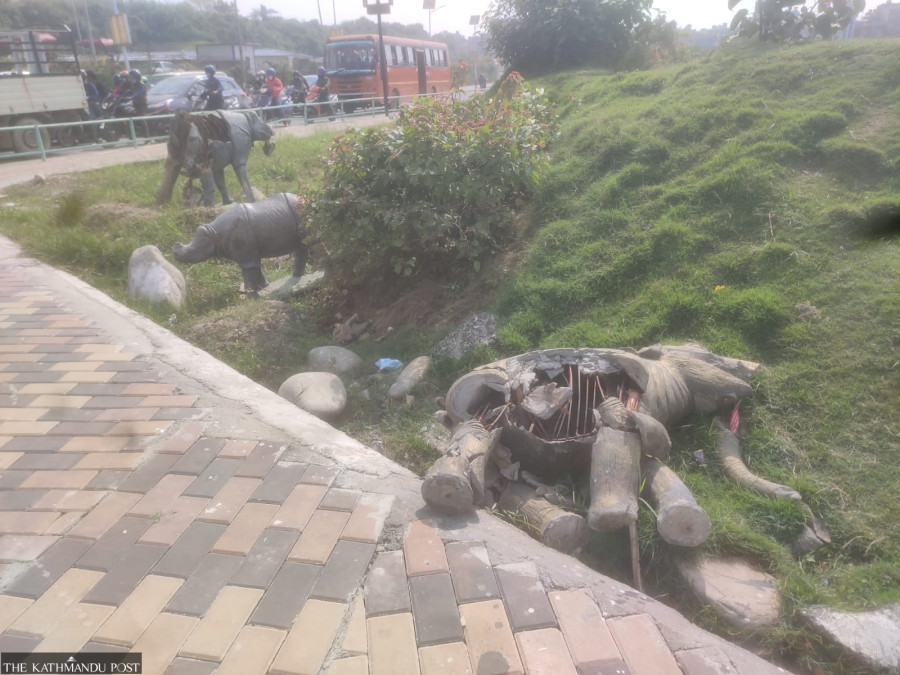Kathmandu
Tinkune park got a facelift. And it was neglected
Its derelict condition shows how city authorities have failed to pay attention to the prime property.
Anup Ojha
The Kathmandu Metropolitan City had put up a grassy berm decorated with flowers and plants around the perimeter of the Tinkune plot near the Kathmandu airport to hide the unsightly barren ground from the view of visiting Chinese President Xi Jinping in the second week of October in 2019. The City had spent Rs6.5 million on the beautification of Tinkune, a triangular plot of land with roads on all sides.
But soon after Xi departed from Kathmandu, many flowers, plants and the Bermuda grass patches on the berm were stolen. Later the City asked police to guard the area.
The then administrative officer of the City, Kedar Neupane, had said the City had spent an additional Rs3 million to beautify Tinkune ahead of the Chinese president’s visit and installed various statues of animals including rhino, elephant and deer.
But now anyone visiting the ‘Tinkune park’ can see that the animal statues on the northern portion have been vandalised, invasive plants have grown out of control, and the ground is littered with human feces. Locals said the vandalism occurred sometime after the Dashain festival.
“Last year, I had spent most of my winter here soaking up the sun, but now the place is full of filth. The park doesn’t have a caretaker,” said Mamata Thapa, who runs a tea shop near the park. “People would come to take pictures with the animal statues but now everything has been torn down.”
Nawaraj Parajuli, the chairman of the City’s ward 32, where the park is located, blamed the City’s negligence for the vandalism. “It is their responsibility to take care of the park but they haven’t been doing their job,” said Parajuli.
In 2014, during the 18th SAARC summit held in Kathmandu, the Tinukne plot was fenced with corrugated zinc sheets to hide the ugly interior. But soon after the summit and the SAARC delegates left, the sheets were stolen. Again in 2018, during the 4th BIMSTEC summit, the Tinkune ground was fenced with flex banners featuring pictures of Nepal’s heritage sites and mountains, among other things. But vandals struck soon after the conclusion of the summit. They punctured holes and tore the banners.
These are not the only cases of deteriorating civic sense in Nepal. In February last year during the Mahashivaratri fair at Pashupatinath, visitors had disfigured a floral arch erected near the south gate of the Pashupatinath temple and a floral bull in the area by plucking the flowers. The Pashupati Area Development Trust said two devotees had spent around Rs 20 million on the floral arrangements for which flowers were imported from countries including Thailand, Australia, and India.
Sociologists link the lack of civic sense to growing public frustration, which they say could have been caused by rising corruption and the increasing gap between the rich and the poor in the country.
“Government officials are getting corrupt by the day. And even when public property is damaged these officials see this as an opportunity to earn under the pretext of fixing the damage,” said sociologist Migrenra Bahadur Karki.
They launch projects eyeing commissions but upkeep is never a priority, he said.
“Growing public frustration could be the reason behind the Tinkune park vandalism. When people lose hope they tend to show such destructive behaviour.”
The 50 ropani (2.5 hectares) Tinkune plot was owned by private individuals but the government in 1976 decided to acquire it by promising compensation to the owners. But the government started paying compensation only from 2005. Over the decades, land prices in Kathmandu had skyrocketed and the owners refused to accept the compensation fixed by the government 29 years ago. They moved court and a verdict has yet to come.
City officials say although compensation for 21 ropanis of land has been paid, the remaining owners are demanding that the government should pay them over Rs3 million per aana (approximately 32 square metre).
“The compensation dispute has become a protracted court battle. The government should resolve the issue by paying fair compensation to the landowners,” said Parajuli, the ward-32 chair.




 20.53°C Kathmandu
20.53°C Kathmandu.jpg)











